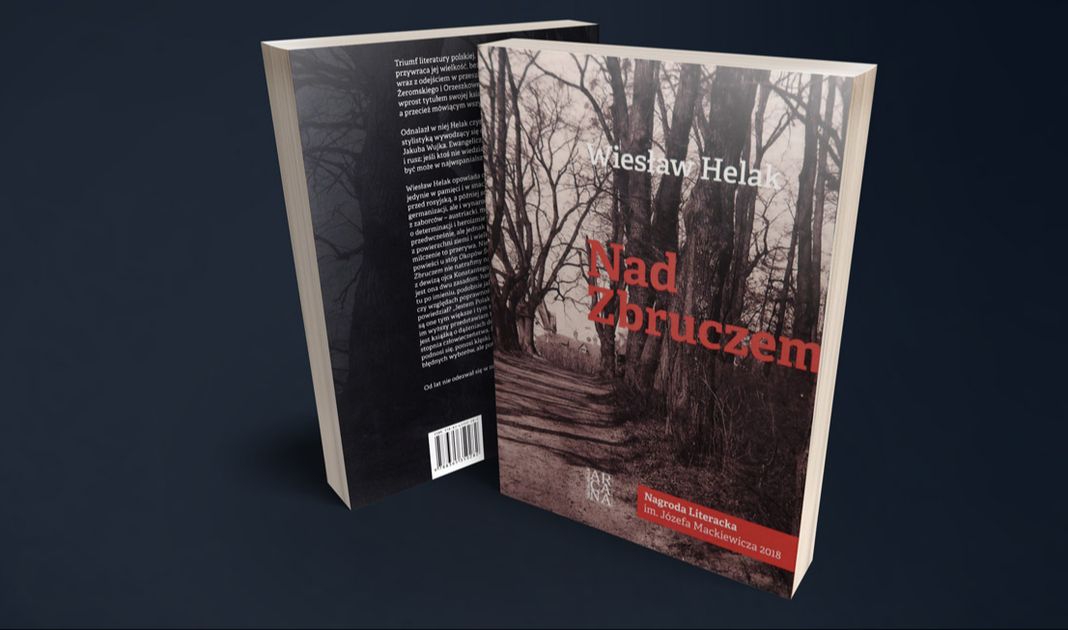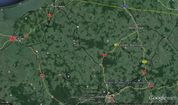„On the Zbrucz” by Wiesław Helak

(Photo: author)
Those who search for it on the map will see in it just another of the tributaries of the Dniester, part of Ukrainian land, a river winding far beyond the borders of modern Poland – and thus, beyond the area of our everyday interests.
Meanwhile, the history of Zbrucz is the history of the fate of the Polish empire aka Polish-Lithuanian Commonwealth in the east. Here, in 1240, the Mongols once stood. Here, on the orders of hetman Stanisław Jabłonowski, the Trenches of the Holy Trinity were built, which still live in the national tradition thanks to [the poet] Zygmunt Krasiński. Here, in subsequent wars, Polish, Ruthenian, Cossack and Turkish blood was shed. Here, finally, new borders were created and rolled up: in the 18th century between the Republic of Poland and Austria, during the partitions between the Russian Empire and Austria-Hungary, then between the Second Polish Republic and the Ukrainian Soviet Republic, as well as the USSR in general.
This seemingly inconspicuous river has always separated the vast eastern steppe from Polish land, divided people according to traditions and denominations, becoming with time the symbolic border of two separate civilizations.
“Konstanty was learning these customs again and he couldn’t get used to it. Since he had returned from Vienna, everything seemed small and provincial here – his father in a worn robe, out of fashion for decades, his mother always in black, and this silence, a terrifying silence, and the steppe. Only the river visible from his upstairs room gave a change.”
The best stories are said to be hatched on the border. They arise from chaos and harmony, which always accompanies the collision of what is separate, foreign, different. No wonder that Wiesław Helak set his novel in this place: it is here, on the Podolian borderland, that Konstanty is born, the son of a Polish heir, a veteran of the January Uprising and a representative of the forgotten landowning ethos. A sensitive and gentle boy, trained in duties towards his homeland, and at the same time dreamy, torn by the European tinsel of imperial Vienna, dreaming of a better life in the service of the brightest Franz Josef. His life will be marked by dilemmas, mistakes, quarrels, which are used by the author to bring us closer to Polish history, but also to ask if we can understand their true meaning.
“This dream, however, did not let him go, he said that it was already impossible to enter the same water in the river. So he stood on the bank of Zbrucz, seeking help in it, and for hours looked at the swift current, then the steppe, but he found no thought in himself that could change what had happened. He closed his eyes and heard a whisper that repeated with persistence that one must enter the eternal circle of birth and death.”
History pervades “Nad Zbruczem”, it is the skeleton of the novel, it delimits the area in which we are cast together with Konstanty, without any mercy. From the period of great empires – and thus partitions – we are moving towards the Great War, watching the formation of Polish legions, we reach the Second Polish Republic, war with the Soviets, then announcements of the end. Helak does not hesitate to put strong accents, showing the power of attraction of the imperial center and the aggression with which social conflicts break out. He points to the importance of identity, also religious – and although the novel was advertised as a Catholic novel, it rather tells about a certain fragment of Polishness, the interpretation of which is left to readers.
Those interested in geopolitics will certainly see, among fiction, a deep awareness of the processes taking place in history.
“Konstanty’s pencil stopped. His father leaned over him and took from his hands the almost completed portrait of the Cossack commander. He watched him closely as if appreciating his son’s talent – and then ripped up. He turned without a word and walked quickly back, sharply fastening the horse. “
“Nad Zbruczem” is a unique novel also in terms of language. Wiesław Helak delights readers with precision, swift language, and poetic, strong Polish that is so rare in contemporary literature. Whether describing the hunt for the greatest wild boar, a walk of two young lovers, or a bloody battle – it intimidates, it hypnotises, it makes the story flow and it is impossible to distract us from our thoughts. It restores importance to descriptions of nature – we immerse ourselves in a fluffy snow sledge, we eat greedily on a blooming steppe horizon, we wade with the queen of horses and her herd in the rapid current of the river … All this in order to extract from them a whole set of meanings, revealing in them the symbols of freedom, stability, beauty and harmony, as the old heir repeats in the novel. The lives of our heroes are crumbling, but they are still to continue in the black soil and the Zbrucz, which also flows in their blood, marking subsequent generations. And when the inevitable end comes – the end of the Polish landed gentry, the death of the manor as a centre of Polish culture and tradition, the agony of the rebirth of Polish statehood – the river rushes on, meandering like a silent witness to history.
“And then Konstanty felt a strange breeze in the air, as if a wind brought turmoil from the steppe and evil silently coming.”
Novels such as “Nad Zbruczem” bring to mind classic works of Polish literature. They let you admire, appreciate and tame a certain historical moment, not so distant at all. We can admire the romantic fervour, see the momentum of the work and point out that from the characters we read about – sometimes different, moving with carriages and thinking in a way not always obvious to us – a straight line runs to ourselves. And that, like them, we – today, between one era and the other – are on the border.
Autor
Olga Kowalska
Graduated in Polish and Romanian philology at the University of Gdańsk. Creator of the literary blog and accompanying YouTube channel - http://WielkiBuk.com, which she has been running since 2012. Reviewer and literature promoter. She conducts author meetings, interviews with writers and workshops related to promoting personal brands on the web. She works in a small company dealing in multimedia services.






Trwa ładowanie...